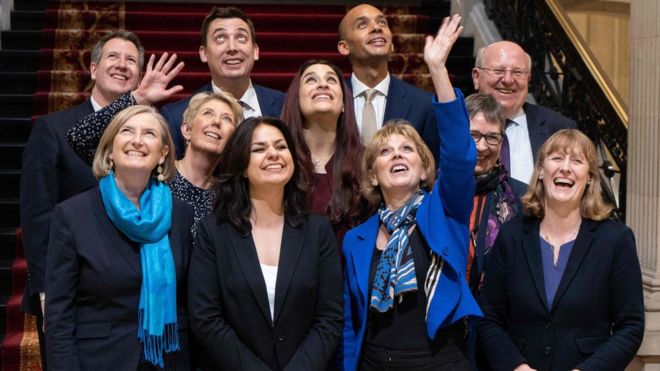The UK Independent Group of 11 MPs celebrate their launch at the House of Commons, February 2019
The “Gang of Eleven”, Labour exiles, Conservative rebels, quitters, splitters, modernizers, traitors: the noun chosen for the defecting MPs of the Independent Group depends on who you ask.
Beginning as several politicians fed up with the constant failings of their respective parties, the new Parliamentary bloc is raising the volume of the pandemonium which grips both Labour and the Conservatives, as Brexit’s March 29 deadline draws ever closer. While Labour cannot seem to overcome its internal argument over anti-semitism, with rifts opening between the leadership and the backbenches, the Conservative-led Government faces the rejection of its yet-to-be presented final plan for Brexit.
But if the breakaway leaves their former parties underneath a fresh wave of criticism, the self-proclaimed modernizers could also get wet unless they can satisfactorily answer questions about the timing of their move.
A People’s Vote on Brexit has dominated the group’s rhetoric, but the abandonment of party channels almost certainly means the group has undermined its ability to bring this to fruition. Instead, ideological disagreement appears to be the underlying factor motivating the resignations, especially on the Labour side.
This is hardly a new issue. Rumours of a centrist split within the opposition party have been circulating almost since the day Jeremy Corbyn was elected as its leader. So why have the Independent Group’s founders chosen this moment for another path?
“Institutionally Antisemitic”
The decision of MP Luciana Berger to co-found the Independent Group, following a no confidence vote against her in her Liverpool Wavertree constituency, was mourned by key figures within Labour. In an e-mail to members, Deputy Leader Tom Watson described Berger as one of the party’s “most courageous and dedicated MPs”.
So Berger’s scathing criticism of the party, which she described as having become “institutionally anti-semitic”, is an icy wake-up call to Corbyn’s leadership. As a Jewish politician, she has been the victim of a tide of abuse via social media. While the harassment has mainly come from individual grassroots supporters, the party executive — and Corbyn — have been far too sluggish in reacting to it.
Corbyn’s slowness to adopt the International Holocaust Remembrance Alliance definition of anti-semitism, his failure to fiercely and instantly condemn anti-semitic acts, and his tendency to caveat any condemnations with criticisms of the Israeli state have all been highlighted as failings of leadership.
But while this appears to be the principal motivation for the defections of Berger and Gavin Shuker, other Independent Group members appear to be driven by political ideology.
“A New Way Forward”
All seven original defectors are members of Progress, founded in 1996 to support Tony Blair’s “New Labour” political vision. It promoted the ideas of pro-business center-left neo-liberalism, a substantial and ultimately successful departure from party norms. The approach won the party 13 years in government, shifting the mainstream of Labour politics for almost two decades. During this time the Corbynite ideas of nationalization, financial regulation, and an increased top-rate tax were sidelined from debates and dismissed as old-fashioned and outdated.
Despite this mainstream record, Chuka Umunna, the longest-standing and most vocal critic of the Corbyn camp, has vowed to end “politics as usual” and called for a “new way forward”. In a bold exercise of political spin, perhaps inspired by his New Labour forefathers, he intends to portray Progress’ Blairite vision as cutting-edge, radical, and anti-establishment.
To help realize this vision, the Independent Group has recruited three Conservative MPs: Anna Soubry, Heidi Allen, and Sarah Wollaston. The principal test of the group’s commitment to “reach across outdated divides” will focus on austerity. Considering that the Tory trio consistently voted in favor of spending cuts — which even Umunna, arguably the most centrist of the group’s founders labelled as an “irresponsible experiment with people’s lives” — can views be aligned beyond Brexit?
One position around which they will all surely unite is that a Corbyn-led government would be a threat to national security. Mike Gapes claimed that the Labour leader is on the “wrong side on so many international issues”. But Independent Group members may be vulnerable to counter-attack: Gapes’ own record on international affairs includes voting in favour of UK involvement in the invasion of Iraq in 2003 and consistently voting against investigations into the war.
A Necessary Ideology or a Politcal Ploy?
The timing of the move will prompt scrutiny of the Independent Group. While Brexit and anti-semitism have been the cited reasons for the departure of the Labour MPs, there appears to be a wider underlying project with a view beyond the debate over departure from the European Union. How this project is manifest in concrete policy proposals remains to be seen.
In recent months, both Theresa May and Jeremy Corbyn have been accused of playing political games with Brexit. Their detractors have condemned them for using the uncertainty of a national crisis and the looming prospect of a No Deal to push the agendas of their respective parties.
Can the Independent Group convince their doubters that they are not doing the same?

